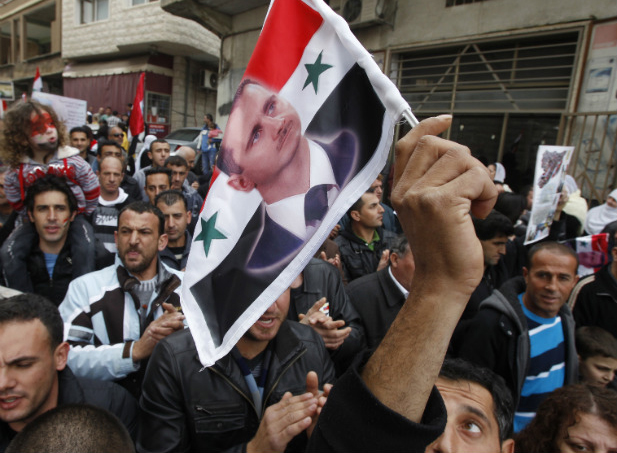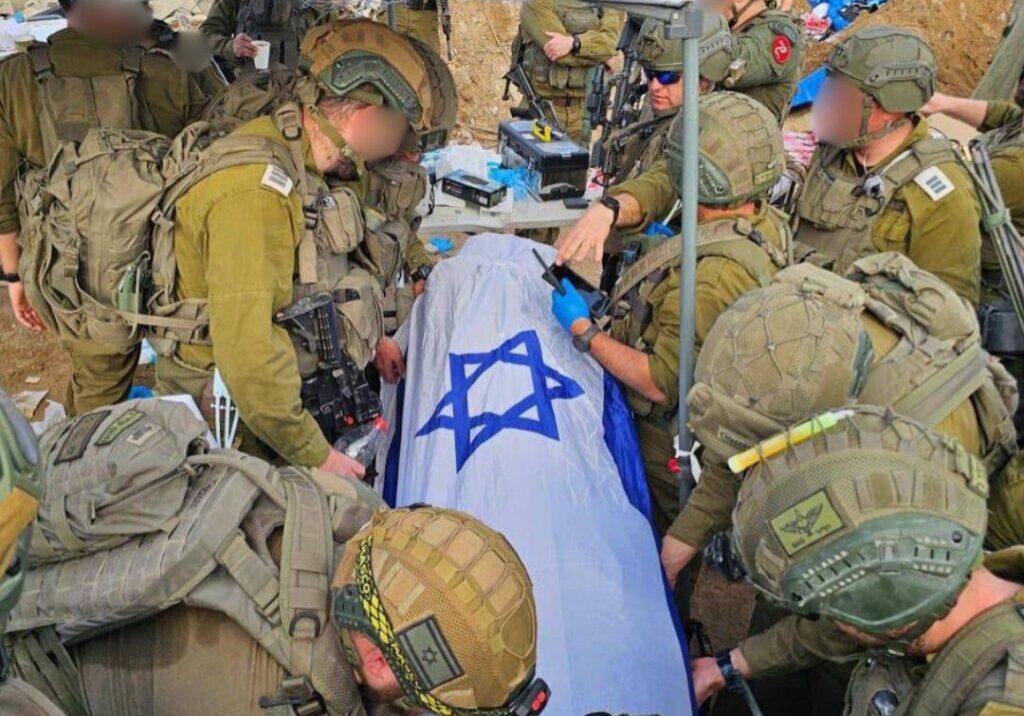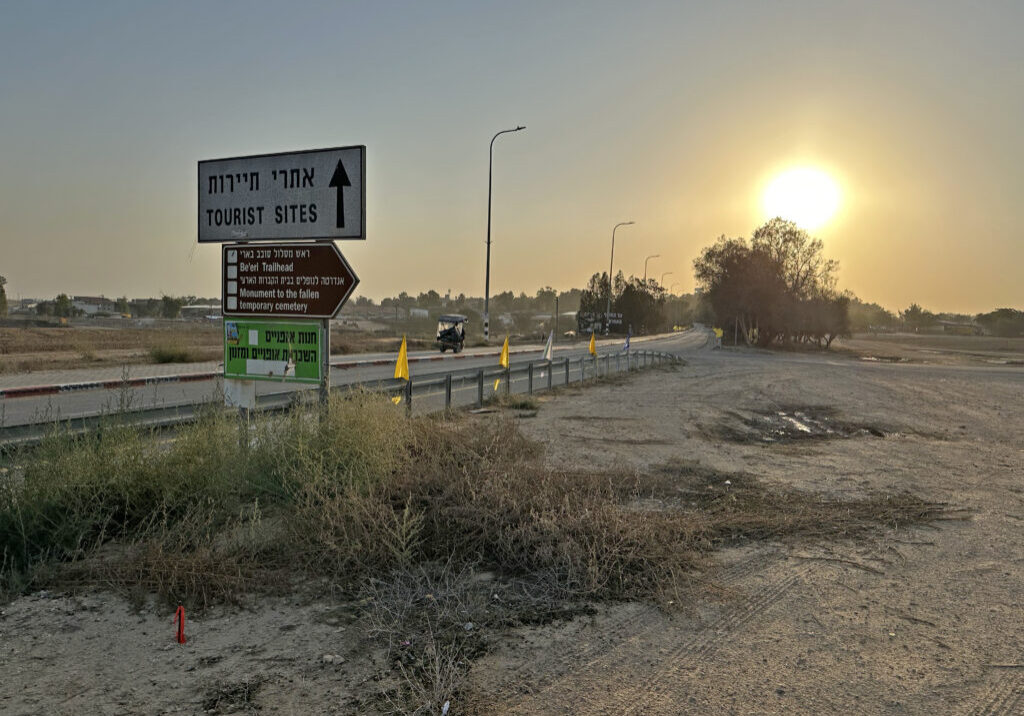Australia/Israel Review
Conflicted Loyalties
May 28, 2013 | Andrew Friedman

The Golan Druze and the Syrian civil war
Andrew Friedman
MAJDAL SHAMS, Israel – Israel’s northern-most town is a sharp study in contrasts. Both main approaches to Majdal Shams, from the south and from the west, are scenic mountain drives, giving way suddenly to urban hustle-and-bustle when entering the town. The scenery changes again suddenly when heading out to tour the Syrian border area, where one rounds a corner to return to bucolic cherry and apple orchards.
To most Israelis, the area has long been a little-known corner of the country, familiar only as a stop on the way up to Mount Hermon, the country’s only ski resort and a popular weekend destination for families from the crowded urban areas. The Hermon Nature Reserve serves as yet another contrast for this Druze city of 11,000 residents: On winter weekends, the town’s restaurants and grocery stores are full of Jewish Israelis, but come Sunday morning (the beginning of the Israeli work week), there is little Hebrew to be heard.
More recently, however, the town has gained notoriety in Israel – some would say the town has become infamous – because of its proximity to the international border with Syria, and to the civil war that has ravaged that country for more than two years. The fighting is clearly audible from Majdal Shams, with the sound of explosions filling the air from the east almost every day.
Like other border towns in Israel, residents here say they are worried about stray mortars or bullets flying across the border, or even that fighting could actually spill across the border. But in contrast to Jewish communities along the Heights, there is another element of worry in Majdal Shams, Massada and Buraq’a, the three Druze towns in the region: Every family here has many close relatives and friends across the border. With reports that both government and rebel troops in Syria have massacred Druze civilians, concerns here about the fighting have taken on a deeply personal connection.
“Of course we talk about what’s going on in Syria. For us, it isn’t ‘over there’, it’s very much ‘over here’. We hear the explosions nearly every day, and I probably spend seven hours a day after work watching the news and reading reports about what’s going on. I just cannot get enough information – I’ve literally been worried sick about my family and friends,” said 35-year-old Yasser Khanger, a native of Majdal Shams.
Identity Crisis
In many ways, the fighting in Syria has thrust the Druze community in the Golan Heights into a deep identity crisis. Over the years of Israeli rule here, residents have repeatedly demonstrated in support of the regime in Damascus and called for the Golan to be returned to Syrian administration. In Majdal Shams, only 1,200 residents have accepted the Israeli citizenship that has been open to them since Israel annexed the area in 1981, and many people say openly that they consider themselves “100 percent Syrian.”
But according to Moshe Ma’oz, a Professor Emeritus of Hebrew University’s Department of Islamic and Middle Eastern Studies and one of Israel’s leading experts on Syrian politics and culture, there may be more than meets the eye vis-a-vis Druze expressions of support for the Assad family dictatorship over the years. For one thing, the community in Syria has maintained close ties to the Alawite leadership in Damascus. President Bashar al-Assad, like his father Hafez before him, has protected the Druze community in Syria from the Sunni majority, and community members on this side of the border have rightly feared that public signs of reconciliation to Israel might have deadly consequences for their loved once across the border.
In addition, Ma’oz said that Israel’s domestic politics over the past two decades have contributed to a sense of loyalty to Damascus. “Since the Oslo peace process began in 1993, there has been a heated debate about whether or not to return the Golan to Syria in exchange for peace. At least twice – under Prime Ministers Rabin and Olmert – it very much looked like a deal had been struck along those lines. That would have placed the residents of Majdal Shams, Massada and Buqa’ata back in Syria, and at the direct mercy of the Syrian regime. In that case, it was a very wise move to show their loyalty even before the actual transfer of power.”
Altogether, Ma’oz said the various elements of their situation combine to create an undeniably complex reality for Golan Heights Druze. He said that economically, Druze in Israel today are far better off than their brothers in Syria, but also added that there are emotional factors at play that serve to counter-balance the economic benefits of being Israeli. “It isn’t all about money,” Ma’oz said.
To the dismay of many community elders, however, there does appear to be a growing willingness, especially amongst the younger generation, to reconcile with Israeli sovereignty. To be sure, every person interviewed for this article expressed strong cultural identification with their Syrian heritage. But the under-30s that spoke to the Australia/Israel Review also said they do not spend time thinking about a return to Syrian sovereignty the way many of their parents do.
However, the nearby explosions, and especially news reports about civilian massacres, have caused many young people to re-think their loyalties, or at least to re-think their relationship with Israel. Take the story of 30-year-old Randa Maddah, a native of Majdal Shams. Despite having grown up under Israeli sovereignty, she felt distant from the State of Israel and its symbols, so when she decided to pursue university study a decade ago, she chose Damascus University over Israel’s Hebrew or Haifa universities, both of which have large Arab student populations. She viewed herself as 100% Syrian and felt she would not have been accepted socially at an Israeli university. And, in any event, she doesn’t speak Hebrew.
By crossing the border into Syria, she felt she would have the opportunity to get to know family members that she’d heard of but never met, and to connect with other young Syrians. Like for many teenagers, university studies were to be a time of soul-searching and identity-building. But instead of cementing her identity as a Syrian Druze, her time in Damascus left her conflicted and confused: The rampant corruption and ferocious presence of the Mukhabarat, President Bashar al-Assad’s secret police, had cowed the Syrian people into submission, to the point that they would never challenge the Assad regime.
Or so she thought. Just two months after returning to Majdal Shams following the completion of her bachelors degree in 2011, demonstrations calling for the ouster of President Assad broke out around Syria. The government moved to quash the protests, rebel groups responded to the violence and the rest is a sad and still unfinished chapter of modern history.
Two years after returning to Israel, Maddah said she is certainly not prepared to accept Israeli citizenship, but she also harbours no illusions about the regime in Damascus. She said the situation in the country she loves is “too terrible to think about”, but she also added that there could be a positive side to the uprising. “I think people have come to realise that there are a lot of things they want to accomplish in their lives, and that they will have to get rid of the Assad family in order to do that. Syria’s got a lot of problems, I know, but the Syrian people have not thrown up their proverbial hands. I think people have suddenly realised that ordinary Syrians can solve Syria’s problems.”
Even more distant from traditional pro-Syrian solidarity are the views of Dolann Abu-Salah, the 35-year-old mayor of Majdal Shams. Abu-Salah’s father was one of the first Golan Druze to accept Israeli citizenship in 1982, a move that saw them cast out of many Druze circles.
“When I was a kid, we weren’t invited to family events because we were Israeli citizens. That forced my dad to take leave of community affairs and to invest in his family.
“Compare that to the reality today: There is just about no boycott of Israeli citizens. Even the older people who maintain this sort of ‘dream-like’ memory of Syria – they’ve decided over the years to invest in their homes and families instead of fighting with Israeli authorities. Lastly, all our residents enjoy the economic and political benefits of living in Israel – we are eligible for national insurance, we enjoy basic freedoms like speech and assembly, etc. People aren’t stupid – they know what they’ve got here, even if there are political reasons that they feel they cannot accept Israeli citizenship. And, I predict, you’ll see more young people accepting that citizenship in the coming years,” Abu-Salah said.
Tags: Israel






